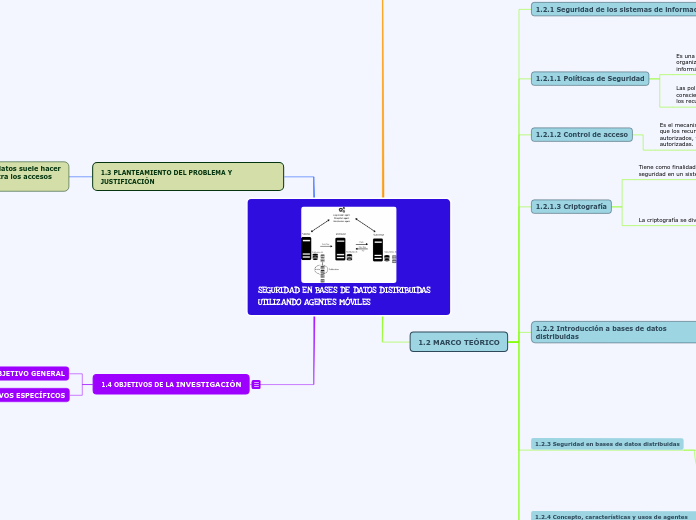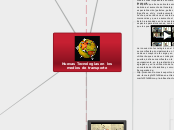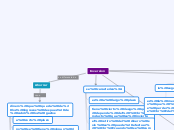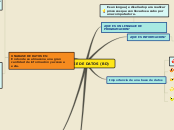SEGURIDAD EN BASES DE DATOS DISTRIBUIDAS UTILIZANDO AGENTES MÓVILES
In linguistics, syntax is the set of rules, principles, and processes that govern the structure of sentences in a given language, usually including word order.
1.4 OBJETIVOS DE LA INVESTIGACIÓN
Materia: Base de Datos Distribuidas
Profesora: Estela Martínez Cruz
Grupo: 5751
Alumna: Reyes Ortega Lizet
Fecha: 09/11/2020
A compound sentence is a sentence that has at least two independent clauses joined by a comma, semicolon or conjunction. An independent clause is a clause that has a subject and verb and forms a complete thought.
1.4.2 OBJETIVOS ESPECÍFICOS
Create your own compound sentences, using the coordinators above.
Realizar pruebas con el sistema de agentes móviles en la base de datos de prueba.
Diseñar y crear una base de datos distribuidas para realizar
pruebas.
1.4.1 OBJETIVO GENERAL
When independent clauses are joined with coordinators (also called coordinating conjunctions), commas and semicolons, they do more than just join the clauses. They add meaning and flow to your writing.
Diseñar e implementar un software para autenticar el acceso a una base de datos distribuida usando agentes móviles.
1.3 PLANTEAMIENTO DEL PROBLEMA Y JUSTIFICACIÓN
A complex sentence is a sentence that contains an independent clause and one or more dependent clauses.
An independent clause can stand alone as a sentence, but a dependent clause even though it has a subject and a verb cannot stand alone.
La seguridad de las bases de datos suele hacer referencia a la protección contra los accesos malintencionados.
The object clause is a phrase on which a verb performs an action. It falls at the end of a sentence, and is governed by a verb or a preposition.
Dado que el uso de agentes móviles en el acceso a bases de datos distribuidas ha mostrado ser flexible, escalable y robusto, surge la inquietud sobre la implementación de un sistema de agentes móviles que capture todas las peticiones de acceso que se hagan a una base de datos distribuidas.
Se propone diseñar e implementar mediante un sistema de agentes móviles una herramienta que, además de disminuir en gran medida el tráfico en el canal, garantice al servidor de bases de datos que no lleguen peticiones con origen anteriormente rechazadas por su no autorización.
1.2 MARCO TEÓRICO
1.2.6 Acceso a bases datos distribuidas mediante agentes móviles
Los trabajos mas recientes con agentes móviles se han desarrollado en código Java, dos de esos trabajos tratan como acceder a base de datos distribuida basada en la tecnología de agentes móviles.
La tecnología de agentes móviles soluciona diversos problemas en varias áreas.
1.2.5 Seguridad en agentes móviles
Los Aglets son capaces de restringir el acceso de los agentes generalizándolos en dos grupos: confiables y no confiables.
Las aplicaciones basadas en agentes móviles no deben implementarse hasta que se tomen medidas mínimas de seguridad en la red, como tener un firewall y brindar protección a los servidores contra código malicioso que
viene en un agente móvil.
1.2.4 Concepto, características y usos de agentes móviles
Un Agente Móvil es un objeto especial que tiene un estado de datos, un estado de código y un estado de ejecución.
Las características básicas de un agente móvil son: autonomía, movilidad, concurrencia, direccionabilidad, continuidad, reactividad, sociabilidad y adaptabilidad.
La característica principal de un agente móvil es que accede a un conjunto de métodos que le permiten moverse de un servidor a otro.
1.2.3 Seguridad en bases de datos distribuidas
Las políticas de acceso mas populares y que se utilizan en la actualidad son: MAC, DAC y RBAC;
RBAC
En esta política los permisos se asocian con roles, y a los usuarios se les hace miembros de los roles. De este modo los usuarios consiguen permisos.
DAC
Esta estrategia de control de acceso está basada en la idea de que los sujetos acceden a los objetos en base a su identidad y a unas reglas de autorización
MAC
Consiste en la clasificación de tanto los sujetos como los objetos en el sistema.
La necesidad de controlar el acceso es uno de los puntos a los cuales se le dedica mucho esfuerzo en los sistemas compartidos, especialmente en los sistemas distribuidos, ya que se requiere de la implementación de procesos y
procedimientos muy estrictos.
1.2.2 Introducción a bases de datos distribuidas
See the example below and try to create your own simple sentences.
Tim is driving the red car.
La fragmentación divide la relación en varios fragmentos, cada fragmento se guarda en una computadora diferente.
La réplica presenta un mayor rendimiento en la lectura de los datos, un aumento del paralelismo y un aumento de la sobrecarga en las actualizaciones.
Una tecnología que se adapta a la situación expuesta son las Bases de Datos Distribuidas.
Las bases de datos distribuidas se encuentran normalmente en sitios geográficos diferentes que se administran en forma independiente y tienen una conexión más lenta.
Es una colección de datos relacionados lógicamente, pero dispersos sobre diferentes sitios de una red de computadoras, cada sitio en la red tiene capacidad de procesamiento autónomo y puede ejecutar aplicaciones locales
1.2.1.3 Criptografía
See the example below and try to create your own simple sentences.
Tim is driving the car with his mother.
La criptografía se divide en dos grandes grupos:
La criptografía de clave pública o asimétrica
Es aquella que utiliza dos claves diferentes para cada usuario, una para cifrar que se le llama clave pública y
otra para descifrar que es la clave privada.
La criptografía de clave
privada o simétrica
Se refiere al conjunto de métodos que permiten tener
comunicación segura entre las partes siempre y cuando anteriormente se hayan intercambiado la clave
Tiene como finalidad prevenir algunas fallas de
seguridad en un sistema computacional.
1.2.1.2 Control de acceso
See the example below and try to create your own simple sentences.
Tim is the driver.
Es el mecanismo por el que se asegura o se intenta asegurar que los recursos son sólo accedidos por los sujetos autorizados, y que solamente pueden realizar las operaciones autorizadas.
1.2.1.1 Políticas de Seguridad
See the example below and try to create your own simple sentences.
Tim drives the car.
Las políticas de seguridad deben concluir en una posición consciente y vigilante del personal por el uso y limitaciones de los recursos y servicios informáticos.
Es una manera de comunicarse con el personal de la organización, en relación con los recursos y servicios
informáticos de la organización.
1.2.1 Seguridad de los sistemas de información
See the example below and try to create your own simple sentences.
Tim drives.
La seguridad en los sistemas de información abarca tres propiedades fundamentales: Confidencialidad, Integridad y Disponibilidad.
La disponibilidad de la información se refiere a la seguridad de los usuarios al solicitar una información pueda ser recuperada en el momento que se necesite.
La integridad se refiere a la seguridad de que una información no ha sido modificada, eliminada, copiada, alterada, entre otros, durante el proceso de transmisión o en su propio equipo de origen.
La confidencialidad se refiere a que la información solo puede ser conocida por personas o usuarios autorizados
La seguridad es un concepto asociado a la certeza, falta de riesgo o contingencia
1. Propuesta de investigación
1.1 Antecedentes
La aparición de los agentes móviles y lenguajes multiplataformas como Java
Traditional grammar defines the object in a sentence as the entity that is acted upon by the subject.
Permitiendo una interacción local en el procesamiento de la información reemplazando tener una conexión constante en la red.
The indirect object identifies the person/thing for whom/which the action of the verb is performed.
The indirect object is usually a person or a thing.
Los ambientes distribuidos han demostrado mejorar el
desempeño de las aplicaciones.
The direct object is the receiver of the action mentioned in the sentence.
La necesidad de tener los programas cerca de los datos para aumentar el rendimiento de las aplicaciones dio origen a tecnologías como CORBA y DCOM.
The predicate of a sentence is the part that modifies the subject in some way. Because the subject is the person, place, or thing that a sentence is about, the predicate must contain a verb explaining what the subject does and can also include a modifier.
El crecimiento acelerado de las redes ha conducido a un mayor desarrollo de sistemas de información distribuidos donde se puede acceder a bases de datos distribuidas.
The subject of a sentence is the person, place, thing, or idea that is doing or being something. You can find the subject of a sentence if you can find the verb.
Ask the question, 'Who or what 'verbs' or 'verbed'?' and the answer to that question is the subject.









